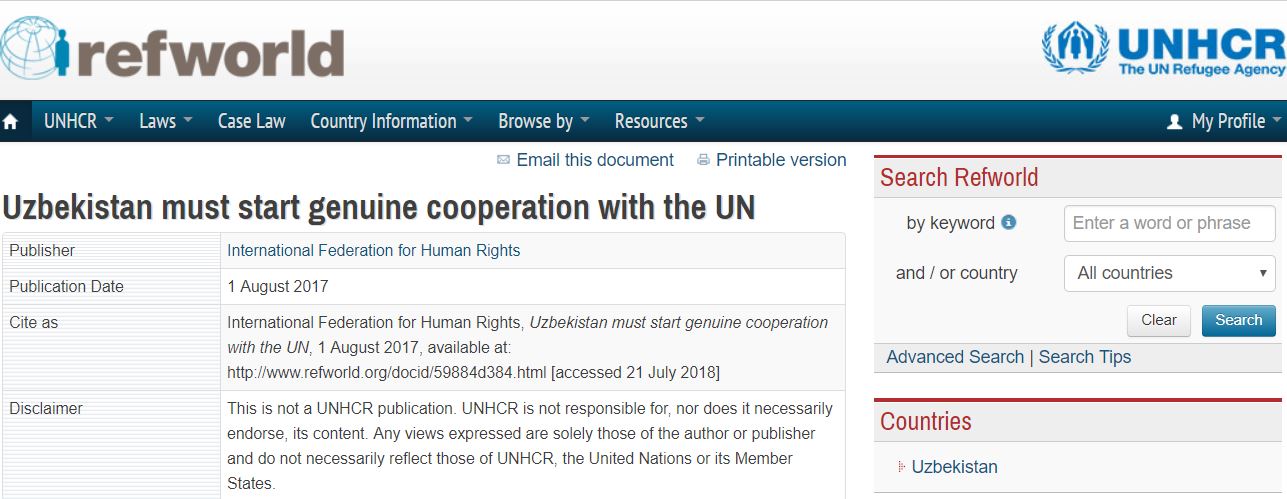| Publisher | International Federation for Human Rights |
| Publication Date | 1 August 2017 |
| Cite as | International Federation for Human Rights, Uzbekistan must start genuine cooperation with the UN, 1 August 2017, available at: http://www.refworld.org/docid/59884d384.html [accessed 21 July 2018] |
| Disclaimer | This is not a UNHCR publication. UNHCR is not responsible for, nor does it necessarily endorse, its content. Any views expressed are solely those of the author or publisher and do not necessarily reflect those of UNHCR, the United Nations or its Member States. |
The Presidency of Shavkat Mirziyoyev, who took over from Islam Karimov in September 2016, has failed to take any measurable steps to implement its international human rights obligations and to cooperate fully with the United Nations.
Two years ago, the UN Human Rights Committee1 found the Uzbek government responsible for the torture and ill-treatment of prominent Uzbek human rights defender Mutabar Tadjibayeva, who was tortured, raped and forcibly sterilized in Uzbekistan.
The Committee found multiple violations of her rights under the International Covenant on Civil and Political Rights (to which Uzbekistan acceded in 1995), committed by Uzbekistan in response to her human rights work, including her right to be free from torture and ill-treatment; to liberty and security; to a fair trial; to freedom of expression and to be protected against discrimination on the grounds of sex and opinion.
Uzbekistan was requested to promptly investigate, prosecute and punish those responsible, and to compensate her, but this decision remains unimplemented together with dozens of other UN decisions. This is despite the fact that the Committee found that Tadjibayeva had presented compelling evidence that showed that she was singled out for harassment, abuse and torture, both as a human rights activist and as a woman.
The deadline set by the UN to implement its decision in Tadjibayeva’s case expired in April 2016, more than a year ago. But instead of meeting its international obligations, in October 2016 Uzbekistan challenged the findings of the Committee citing arguments already presented to the Committee during the case review and which were assessed as not credible.
Uzbekistan’s submission to the Committee contained serious factual mistakes. The government also stated that it was impossible to establish the truth in Tadjibayeva’s case since it had destroyed all relevant files past the 10-year time limit set in the national legislation for file preservation. REDRESS and FIDH informed the Committee that Uzbekistan had not complied with any of the measures ordered two years ago.
The UN Human Rights Committee, the UN Special Rapporteur on Torture and the UN Committee against Torture have documented for more than a decade the widespread nature of torture in Uzbekistan’s prisons and places of detention.
For 14 years, Uzbekistan denied access to at least 14 UN experts who requested invitations, including the UN special rapporteurs on the situation of human rights defenders and on torture, and has failed to comply with recommendations made by various expert bodies.
The first visit of a high level human rights official was not allowed until May 2017, when the UN High Commissioner for Human Rights visited the country for two days and urged the Uzbek government to translate words into actions.
For more information or to request an interview, please contact Eva Sanchis, Head of Communications of REDRESS, on +44 (0)20 7793 1777 or eva@redress.org (English), Mutabar Tadjibayeva (Uzbek, Russian), President of Fiery Hearts Club, on +33 6 79 23 39 27 or Audrey Couprie (English, French, Spanish), Press Officer of FIDH, on acouprie@fidh.org, or +33 6 48 05 91 57.
Background information
Mutabar Tadjibayeva has repeatedly sought an investigation from the Uzbek authorities into the serious human rights violations that she has suffered since 2002, but her claims have never been properly investigated and no-one has ever been prosecuted for them.
Tadjibayeva forcefully condemned the killing of hundreds of unarmed civilians by government forces in the city of Andijan in May 2005. Five months later, she was arrested by masked and armed security forces. She was charged on 18 counts of criminal activity, including tax fraud and membership of an illegal organisation – her own human rights group, the Fiery Hearst Club. In 2006, she was sentenced to eight years in prison following a trial that violated the most basic international fair trial standards.
While in prison, she was forced to undergo an operation to remove her uterus, which left her infertile. She has never been given the reason for the operation. During her two years and eight months in prison, she suffered other forms of torture and ill-treatment, including being beaten, hung from a hook, forced to stand naked in the cold until she fell unconscious, and being placed in solitary confinement and a psychiatric ward with dangerous criminals. She was freed in June 2008, after intensive efforts by diplomats and human rights organisations.
Previous to her imprisonment, in April 2005, Tadjibayeva was kidnapped by several law enforcement officials and taken to the Department of Internal Affairs, where she was interrogated about her human rights activities and gang-raped.
In 2005, Tadjibayeva was nominated for the Nobel Peace Prize. In 2008 she received the Martin Ennals Award for Human Rights Defenders whereas the Fiery Hearts Club that she founded, and which now runs from Paris where she has been living as a refugee since 2009, was awarded the Medaille de la République Française de la Liberté, Egalité, Fraternité.
The Uzbek government has a well-documented record of serious human rights violations, including systematic torture and ill-treatment of human rights defenders and political prisoners. There have also been reports by rights organisations of a government campaign to forcibly sterilise women in Uzbekistan.


